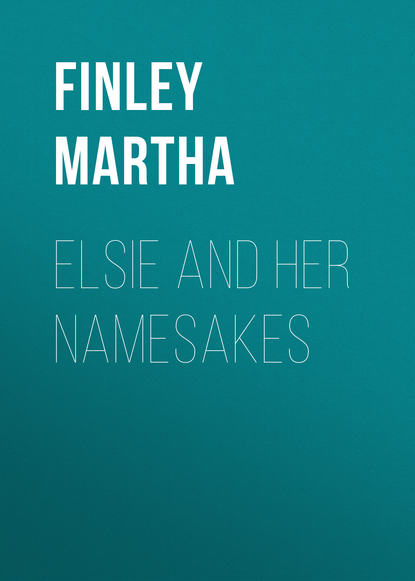По всем вопросам обращайтесь на: info@litportal.ru
(©) 2003-2024.
✖
Elsie and Her Namesakes
Настройки чтения
Размер шрифта
Высота строк
Поля
"I can't tell you that, Neddie," she replied. "I think it has never been known who he was."
"Is there some more story about Nast and his pictures?" he asked.
"Yes; he made a great many more pictures. One, on the first page of the Christmas Harper, was called 'Santa Claus.' It showed him dressed in the Stars and Stripes, distributing presents in the military camp. In the same paper was another called 'Christmas Eve.' It had two parts: one, in a large wreath, was a picture of the soldier's family at home; and in another wreath was the soldier by the camp-fire, looking at a picture of his wife and children. Letters came from all parts of the Union with thanks for that picture. A colonel wrote that it reached him on Christmas Eve; that he unfolded it by the light of his camp-fire and wept over it. 'It was only a picture,' he said, 'but I couldn't help it.'"
"I don't wonder," sighed Elsie softly, "for how he must have wanted to be at home with his wife and children."
Harold and Grace, who had been taking their morning exercise upon the deck, returned to the saloon and joined the group of listeners just in time to hear their mother's story of Nast's Christmas pictures.
"Nast certainly did a great deal for the Union cause," said Harold. "Do you remember, mother, what Grant said of him when asked, 'Who is the greatest single figure in civil life developed by the Civil War?'"
"Yes. He answered without hesitation, 'Thomas Nast. He did as much as any one man to bring the war to an end.' And many of the Northern generals and statesmen held the same opinion."
"Yes, mother; and all lovers of the Union certainly owe him a debt of gratitude."
"Now, children, shall I tell you something about Lincoln?" she asked. There was an eager assent, and she went on. "He was a noble, unselfish, Christian man; came to the Presidency in a dark and stormy time; did all in his power to avert civil war without allowing the destruction of the Union, denying the right of any State or number of States to go out of the Union. But the rebellious States would not listen, declared themselves out of the Union, began seizing government property, firing upon those who had it in charge, and Lincoln was compelled to call out troops for its defence.
"But I shall not go over the whole sad story now. After four years, when it was all over, every loyal heart was full of joy and Lincoln's praise was on every tongue. They felt that he had saved his country and theirs, and that at the expense of great suffering to himself. But only a few days later he was fatally shot by a bad fellow, an actor named John Wilkes Booth."
"One of the Confederates, grandma?" asked Ned.
"I think not," she replied. "It is said that his controlling motive for the dreadful deed was insane conceit. That for weeks beforehand he had declared his purpose to do something that would make his name ring round the world."
"As it has," remarked Harold; "but in such a way as I should think no sane man would desire for his."
"And did they hang him?" asked Ned.
"No," replied his uncle; "the awful crime was so sudden and unexpected that for several minutes the audience did not comprehend what had been done, and the assassin escaped for the time. He ran out, leaped upon a saddled horse kept waiting for him and galloped away into the country. He rode into Maryland, from there into Virginia, and took refuge in a barn. He was pursued, cavalry surrounded the barn, and called upon him and his companion to surrender. The other man did, but Booth refused and offered to fight the captain and all his men; then they set the barn on fire, and one of them, against orders, shot Booth in the neck. That shot made him helpless. He was carried out, laid on the grass, and after four hours of intense agony he died."
"That was a sad, sad time," sighed Mrs. Travilla. "The whole North was in mourning for Lincoln, and even the South soon saw that it had lost its truest and best friend; and there was a movement of sympathy for our nation in its great loss throughout the world."
"Yes, mother," said Harold; "and time only increases the esteem of the world for that great and good man."
CHAPTER V
The next day, after some healthful exercise upon the deck, the children returned to the saloon, and gathering about Grandma Elsie, begged for another story.
"Something historical?" she asked with her pleasant smile.
"Yes, grandma, if you please," replied Elsie. "I liked your story of Marion so much, and should be glad to hear about some other Revolutionary soldier who helped to drive away the British."
"Well, if you would all like that, I will tell you of Sergeant Jasper and his brave doings."
The other children gave an eager assent, and Mrs. Travilla began.
"History tells us that William Jasper was born in South Carolina in 1750. That would make him about twenty-six years old when the Revolutionary War began. He was patriotic, and at once enlisted as a sergeant in the Second South Carolina Regiment.
"In June, 1776, a British fleet appeared off Charleston bar, and several hundred land troops took possession of Long Island, separated from Sullivan's – on which was our Fort Sullivan – only by a narrow creek. At half-past ten o'clock on the morning of the 28th of June the British ships anchored in front of our Fort Sullivan, which instantly poured a heavy fire upon them.
"But I shall not go into a detailed account of the battle, which, Lossing tells us, was one of the severest during the whole war, redounded to the military glory of the Americans, greatly increased the patriotic strength at the South, and was regarded by the British as very disastrous; for the loss of life on their ships was frightful.
"But I must tell you of a daring feat performed by Sergeant Jasper. At the beginning of the action, the flag-staff of our fort was cut away by a ball from a British ship, and the Crescent flag of South Carolina, that waved opposite the Union flag upon the western bastion, fell outside upon the beach. Jasper leaped the parapet, walked the length of the fort, picked up the flag, fastened it upon a sponge staff, and in the sight of the whole British fleet, whose iron hail was pouring upon the fortress, he fixed the flag firmly upon the bastion. Then he climbed up to the parapet and leaped, unhurt, within the fort, three cheers greeting him as he did so."
"Oh, how brave he was!" cried Ned. "I hope they gave him a reward for it."
"Yes," said his grandma, "the governor, on the day after the battle, visited the fort, and rewarded Jasper with the gift of his own small sword, a handsome one which hung by his side, and thanked him in the name of his country. He also offered him a lieutenant's commission; but the young hero declined it, saying, 'I am not fit to keep officers' company; I am but a sergeant.'
"He seems to have had no educational advantages, as he could neither read nor write."
"Oh, what a pity!" exclaimed several young voices.
"Yes, it was," sighed Mrs. Travilla. "I hope you are thankful, my dears, for your superior advantages.
"I have read that Jasper was given a roving commission, and choosing six men from the regiment to go with him, he went here and there, and often returned with prisoners before his general knew of his absence.
"Jasper had a brother who had joined the British, but he loved him so dearly that he ventured into the British garrison to see him. The brother was greatly alarmed at sight of him, lest he should be seized and hung as an American spy, his name being well known to many of the British officers. But Jasper said, 'Don't trouble yourself; I am no longer an American soldier.'
"'Thank God for that, William!' exclaimed the brother, giving him a hearty shake of the hand; 'and now only say the word, my boy, and here is a commission for you, with regimentals and gold to boot, to fight for his Majesty, King George.'
"But Jasper shook his head, saying that though there seemed but little encouragement to fight for his country, he could not fight against her. He stayed two or three days with his brother, hearing and seeing all that he could, then bade good-by and returned to the American camp by a circuitous route, and told General Lincoln all that he had seen."
"Grandma," said Ned thoughtfully, "it seems to me he did not tell the truth when he said he was not an American soldier. Was it right for him to say that?"
"I think not, Ned; but I suppose he thought it was, as he meant by it to help his country's cause. But remember, my dears, it is never right to do evil even that good may come.
"But to go on with my story. Jasper soon went again to the English garrison, this time taking with him his particular friend, Sergeant Newton, a young man of great strength and courage. Jasper's brother received them very cordially, and they remained several days at the British fort without causing the least alarm.
"On the morning of the third day the brother said to them, 'I have bad news to tell you.' 'Aye, what is it?' asked William. His brother replied that ten or a dozen prisoners had been brought in that morning, as deserters from Savannah; that they were to be sent there immediately, and from all he could learn, it would be likely to go hard with them, as it seemed they had all taken the King's bounty."
"What does that mean, grandma?" asked Ned.
"That they had agreed to remain British subjects instead of fighting for their country; and for that the British were to protect them against the Americans. But it seems they had changed their minds and gone over to the cause of their country.
"Jasper asked to see the poor fellows, and his brother took him and Newton to the spot where the poor fellows were, handcuffed, and sitting or lying upon the ground. With them was a young woman, wife of one of the prisoners, sitting on the ground opposite to her husband, with her little boy leaning on her lap. Her dress showed that she was poor, and her coal-black hair spread in long, neglected tresses on her neck and bosom. Sometimes she would sit silent, like a statue of grief, her eyes fixed upon the ground; then she would start convulsively, lift her eyes and gaze on her husband's face with as sad a look as if she already saw him struggling in the halter, herself a widow and her child an orphan. The child was evidently distressed by his mother's anguish, and weeping with her.
"Jasper and Newton felt keenly for them in their misery. They silently walked away into a neighboring wood, tears in the eyes of both. Jasper presently spoke. 'Newton,' he said, 'my days have been but few, but I believe their course is nearly finished.' Newton asked why he thought so, and he answered, because he felt that he must rescue those poor prisoners or die with them, otherwise the remembrance of that poor woman and her child would haunt him to his grave.
"'That is exactly what I feel, too,' replied Newton, 'and here is my hand and heart to stand by you, my brave friend, to the last drop. Thank God, a man can die but once, and why should we fear to leave this life in the way of our duty?'
"Then the two embraced each other and at once set about making the necessary arrangements for carrying out their desperate resolution."
"Oh, how brave and kind they were!" exclaimed Elsie Raymond. "I am proud of them as my countrymen."
"As we all may be," said her grandma, then went on with her story.
"Shortly after breakfast the next morning the prisoners were sent on their way to Savannah, guarded by a sergeant and corporal with eight men."
"Why, that was ten men for our two men to fight!" exclaimed Elsie Dinsmore.











